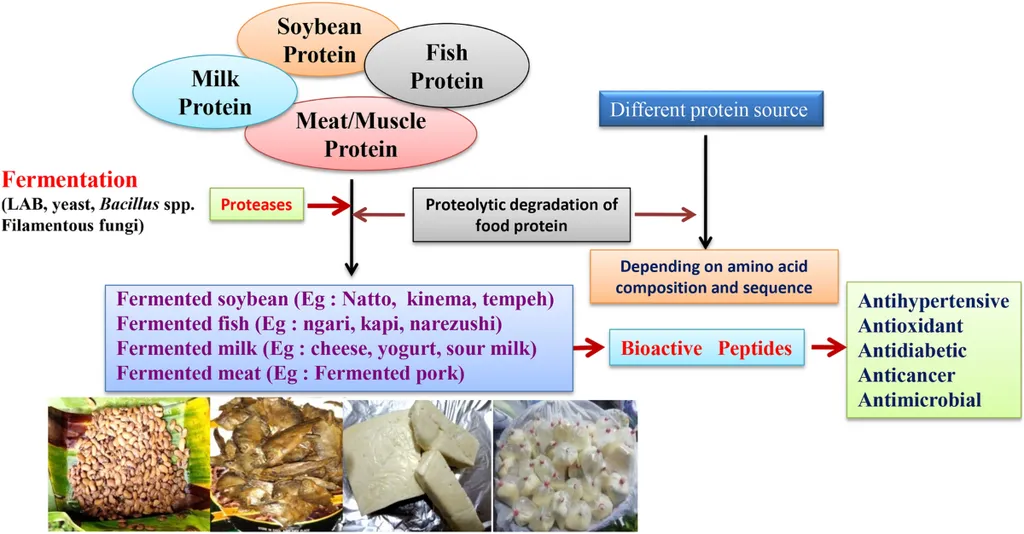In the heart of Indonesia’s culinary tradition lies a treasure trove of health-promoting compounds, hidden within the country’s diverse array of high-protein fermented foods. A recent study published in *Jurnal Ilmiah Perikanan dan Kelautan* (Journal of Fisheries and Marine Sciences) has shed light on the untapped potential of these traditional foods as a source of bioactive peptides (BPs), offering promising avenues for the food and health industries.
Bioactive peptides are short protein fragments that pack a powerful punch, exhibiting a range of physiological benefits, from antioxidant and antihypertensive to antimicrobial and antidiabetic activities. These compounds are often released during the fermentation process, making high-protein fermented foods (HPFF) a rich source of natural health-promoting agents.
Indonesia, with its rich biodiversity and long-standing fermentation traditions, boasts a unique variety of traditional HPFF. However, the potential of these indigenous products as BP sources has remained largely unexplored. Muhammad Alfid Kurnianto, a researcher from the Department of Food Technology at Universitas Pembangunan Nasional Veteran Jawa Timur, and his team have sought to change that.
“We wanted to bridge this critical knowledge gap and consolidate evidence on bioactive peptides from Indonesian fermented foods,” Kurnianto explained. Their review, which examined publications from 2000 to 2023, categorized Indonesian HPFF based on raw material and highlighted their functional and health-related properties.
The study revealed that Indonesian HPFF, including tempeh, rusip, dangke, pekasam, and cangkuk, contain BPs with diverse bioactivities. Tempeh, for instance, showed antidiabetic and antihypertensive potential, while rusip exhibited antioxidant and cholesterol-lowering effects. Dangke and cangkuk demonstrated antimicrobial and ACE-inhibitory activities, which can help lower blood pressure.
These functional properties are influenced by various factors, including the type of substrate (such as legumes, fish, or milk), microbial composition (lactic acid bacteria, Bacillus spp., yeasts), and fermentation conditions. Notably, certain Indonesian HPFF exhibit multi-functional peptides with synergistic health effects, suggesting significant therapeutic promise.
The implications of this research extend beyond the borders of Indonesia. As the global demand for natural, functional foods continues to grow, the bioactive peptides found in Indonesian HPFF could offer a sustainable and innovative solution for the food and health industries. Moreover, the study underscores the importance of preserving and studying traditional fermentation practices, which could hold the key to unlocking new health-promoting compounds.
“Our review provides a foundation for future investigations into peptide bioactivity and supports functional food innovation,” Kurnianto said. “It also highlights the global relevance of Indonesia’s fermentation heritage in health science and sustainable nutrition.”
As the world grapples with the challenges of an aging population and the rise of lifestyle-related diseases, the search for natural, effective, and sustainable health-promoting compounds has never been more urgent. The bioactive peptides found in Indonesian high-protein fermented foods may well be a significant piece of the puzzle, offering a delicious and nutritious path to better health.
In the words of Kurnianto, “The potential is there, and we are just beginning to scratch the surface.” With further research and investment, the bioactive peptides from Indonesia’s fermented foods could soon take their place on the global stage, contributing to a healthier, more sustainable future for all.

